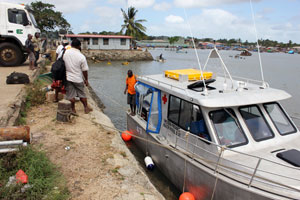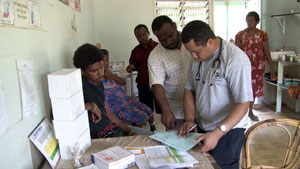Australian support to tuberculosis (TB) management in Western Province is now helping to deliver for health services to very remote communities so patients can receive treatment without having to travel.
A new purpose-built sea ambulance is making monthly medical outreach trips along the coast of South Fly and also makes it possible for patients and suspected new cases of TB to be transported back to Daru Hospital for further diagnosis and treatment.
On 2 August, a team from Daru Hospital travelled to Mabaduan in the South Fly District, which is home to almost a third of the 92 TB patients transferred from Queensland Health back to PNG health services since September 2011.
Abel Marome, Western Province TB Coordinator, said the medical outreach clinic detects, treats and monitors TB patients, while AusAID-funded infrastructure, staff and equipment, is also improving TB diagnosis and treatment at Daru Hospital.
'The AusAID-funded digital Xray and GeneXpert machines are having a great impact on the TB program activities,' Mr Marome said.
Dr Kabe Vakadem, the Registrar of Internal Medicine at Daru Hospital, who also participates in the outreach clinics, said that TB continues to be their biggest challenge.
'There are a lot of challenges with infrastructure, manpower and the coverage of health services in PNG, but efforts are being made through Provincial Health, Daru Hospital and assistance from AusAID,' Dr Vakadem said.
'With the new TB program and support from our stakeholders the burden is under control and we are happy.'
The CEO of World Vision Australia, Tim Costello, commended the approach being taken to combat TB across PNG on his recent trip to Port Moresby and Madang where he observed health work being carried out.
The Stop TB in Western Province program, funded by AusAID and run in partnership with PNG's National TB Program and World Vision, is increasing the number of TB cases being detected, which means more patients can get appropriate treatment sooner to help control TB in the long term.
'TB is an illness we know we can treat and cure, but it takes a long time. If patients can't do a full six months of treatment it can actually make things worse,' Mr Costello said.
'This is why TB treatment has got to be community based. Detection has to be done in the community. Educating about the symptoms has to be done in the community. And treatment–taking medicines for six months–has to be done in the community.'


